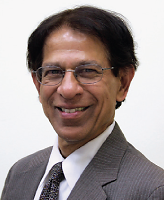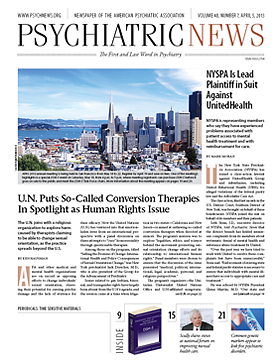Wikipedia mentions more than a dozen types of diversity. The type most relevant to psychiatry is multiculturalism (ethnic diversity), the promotion of multiple ethnic cultures. Multiculturalism is often contrasted with the concept of assimilationism and has been described as a “salad bowl” or “cultural mosaic” rather than a “melting pot.” The best descriptive summary of such diversity is by Gladstone (gladstone.uoregon.edu/~asuomca/diversityinit/definition.html), according to which diversity encompasses acceptance, respect, and understanding that each individual is unique, while recognizing individual differences in terms of race, ethnicity, gender, sexual orientation, age, religious beliefs, and so on. It is the exploration of these differences in a safe, positive, and nurturing environment.
Acceptance of diversity doesn’t come naturally. At the regional brain level, it may be conceived of, in a simplistic manner, as a conflict between dorsolateral prefrontal cortex (the rational, cold-calculating, self-serving part) and ventromedial prefrontal cortex (compassionate, sensitive, other-directed part). It is only by training, role modeling, and practicing that we learn to be tolerant of diversity. We then find out, however, that diversity is invaluable from both rational and compassionate perspectives and that there should be no conflict between these two tendencies.
I invited my long-time friend and respected colleague Carl Bell, M.D., to discuss diversity as it applies to psychiatry and to suggest ways in which APA can seek to enhance diversity. Below is his thoughtful and thought-provoking commentary. Dr. Bell is director of the Institute for Juvenile Research in the Department of Psychiatry, College of Medicine, University of Illinois at Chicago.
Carl C. Bell, M.D.
“We hold these truths to be self-evident, that all men are created equal, that they are endowed by their creator with certain unalienable Rights, that among these are Life, Liberty, and the pursuit of Happiness.”
Although these “rights” were originally intended to be unalienable for European-American men, America’s ideal is that we judge people by content of their character, and not the color of their skin, country of origin, gender, class, culture, religion, sexual orientation, age, or other external identifiers. Unfortunately, our brains are designed to differentiate and avoid people that we perceive as different from us, and we are prone to stereotype, fear, project negative attributions, avoid, and shun those who are “others.” Therefore, despite electing an African-American president for two terms, America continues to fall short of its ideals.
As psychiatrists, we should understand how our limbic system drives us, and we should strive to be equally or more driven by our more mature, frontal-lobe systems instead of automatically reverting to our “default” when confronted by the “other.” We do this by first understanding that race is a biological fallacy. Race is a social construct based on human biology or mental functioning causing human beings to automatically stereotype (
http://ajp.psychiatryonline.org/article.aspx?articleID=157092). Similarly, people’s “other” external characteristics give us primordial reasons to identify people as “not us” and to exclude them from our lives. Our American ideals and goals dictate this is unfair and unreasonable.
Second, we should understand that for centuries before America existed, cultures much older than ours have been struggling with psychiatric and behavioral disorders, and, accordingly, we need to understand there is much we can learn from other cultures’ corrective, protective, and strength-based practices. It is ethnocentric to think American psychiatry has all the answers.
Our 21st-century communication is virtually shrinking Earth, and other cultures’ wisdom is at risk for being lost, hopefully to be rediscovered later—so why should we be so arrogant as to “not remember the past so we can be condemned to repeat it.” Too many of us scoff at ancient traditions and cultures as not being “directionally correct.”
Of course, it is difficult for us to develop a critical mass of scholars who are conversant with different cultural practices that strengthen and preserve that culture’s people (
http://www.clinicalpsychiatrynews.com/views/commentaries/single-article/the-power-of-culture/dcaf50d064a0a9f021f3dbd31fee100c.html). Psychiatrists from different cultural and ethnic backgrounds are at risk for being isolated from each other; thus those of us who understand the importance of culture and ethnicity tend to be alone in the new emphasis on biological psychiatry. As psychiatrists, we need to create a cultural emphasis on diversity within our ranks. At a recent American College of Psychiatry meeting, Dale Walker, a Native-American psychiatrist and colleague for 30 years, lamented the difficulty of developing a “critical mass” of culturally and ethnically aware psychiatrists who can study and fill the gaps in cultural, racial, and ethnic psychiatric knowledge. The notion of using the Internet to create a virtual “critical mass” surfaced, and APA resources could remediate this problem. Such a learning collaborative could inform all of us regardless of our culture of origin. A lesson from biology tells us that an ecotone is the area where ecological zones meet—a transition zone from one ecological zone to another. It turns out that ecotones are rich in diversity that enhances capacity for learning and biologic innovations.
As psychiatrists, we need to heighten our cultural humility. Our Western culture needs practice being humble, and, while some would say humility is an oxymoron that is antithetical to American culture, we have that capacity—innovation is a Western cultural value. We could have been so much further along had we been more open to diverse ideas and practices, for example, mindfulness (a central feature of East-Indian culture); the understanding that change is a fundamental part of life (a central feature of Asian culture). We would be more comfortable embracing spirituality as a legitimate mental process (a central feature of African-American culture)—instead of a pathological “oceanic feeling.” If we were more humble, we would be quicker to understand that exercise stimulates neurogenesis, three-ball-cascade juggling increases connectivity, the environment shapes genetic expression, cerebellar stimulation fosters cerebral development, and family-strengthening techniques (a central feature of Latino culture) can prevent risky youth behaviors. Being more culturally humble would have lessened Western medicine’s fascination with risk factors often to the exclusion of protective factors, sooner—a struggle we continue to be embroiled in. Lastly, we need to make a more substantial investment in global mental health and stop thinking Americans are the only ones who count on the planet. ■


